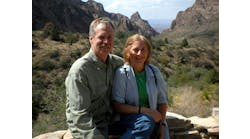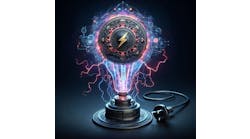David Johnson, a career Yokogawa employee, was named earlier this year to the post of President and COO of Yokogawa Corporation of America, succeeding Shu Kaihori, who was being promoted back home to Japan. Johnson is the latest in a line of high quality American COOs that Yokogawa has used to produce a very high profile in the USA.
Back in the early 1990s, for a magazine, unfortunately now-defunct, called Industrial Marketing Practitioner I wrote a case study in b-school mode about three companies who made big pushes to enter the US market in the late 1970s. "Company K," "Company EH," and "Company Y." It should be immediately evident who the three were. I noted that the difference between the abysmal results that Company K and Company EH had to that date produced, and the excellent results Company Y had produced is that Company Y, under the leadership of Isao Uchida, had believed their American employees when they said that there was a different way of doing business in the United States. Uchida named a US-born CEO, and allowed YCA to become a more American company than other Japanese-American subsidiaries. Growth exploded.
With the creating of Yokogawa Electric International in April of this year, Uchida acknowledged the fact that Yokogawa has been more hampered by the Japanese business culture than would be apparent, looking at YCA. He moved the headquarters of YEI to Singapore, outside of Japan, and told Minaki-san to build, not a Japanese business culture, but an international business culture.
David Johnson, YCA's new President and COO is an example of this new "not really Japanese" business culture.
He noted that this is Yokogawa's 90th anniversary, and noted the 30th anniversary of the Centum DCS.
He announced that business is doing very well.
Then he got down to it.
He noted that Isao Uchida, Yokogawa's visionary CEO, had made an extremely un-Japanese boast at the ARC Forum in February of 2005, where he announced that Yokogawa planned to be the world's largest industrial automation company by 2010. This, of course, had created substantial hilarity and scorn from Yokogawa's Big Six competitors, but it seems, according to Johnson, Yokogawa is deadly serious.
Based on the way they penetrated the US market to begin with, if they are serious, they should be taken seriously by every other vendor in the market. Watch out. Yokogawa doesn't often make mistakes.
Johnson pointed to the 20,000 employees, 29 countries, 4 regional centers, 8 global response centers, and 225 local service centers, and noted that Uchida-san has decreed that "Failure is not an option" in his eyes. Johnson has the mandate to become at least the #3 automation vendor in the US, in order for Yokogawa to become #1 by 2010.
Johnson is serious, and so is Yokogawa.
He noted that the "chicken and egg game" of trying to build up sales in order to justify opening local service and sales support centers is wrong, and Yokogawa has committed to building up infrastructure first, and then working to get the sales to justify the expense. This is a non-risk-averse strategy that usually works when companies like Yokogawa don't lose their nerve halfway through the process.
Johnson also announced a new Canadian alliance with DMI, and two integrator alliances with Englobal and Applied Control Technology, adding Yokogawa to the long list of automation companies trying to become service companies instead of simply product companies.
They seem to be making the right moves, they do.
Walt
Latest from Home
Latest from Home
Leaders relevant to this article:



